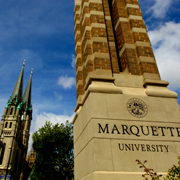
The Faculty Council (FC), a standing committee of the University Academic Senate, provides a forum for discussing and vetting matters of immediate academic and professional importance and draws upon the collective experience and knowledge of the faculty as a consultative body for the senate.
Contact at facultycouncil@marquette.edu
Members
| Dr. Timothy McMahon | Klingler College of Arts and Sciences | 2028 |
| Dr. Chima Korieh | Klingler College of Arts and Sciences | 2026 |
| Dr. Margaret Hughes-Morgan (Chair) | College of Business Administration | 2026 |
| Dr. Erik Ugland | Diederich College of Communication | 2028 |
| Dr. Elisabeta Karl | School of Dentistry | 2028 |
| Dr. Doris Walker-Dalhouse | College of Education | 2027 |
| Dr. Fabien Josse | Opus College of Engineering | 2027 |
| Dr. Ann Millard | College of Health Sciences | 2026 |
| Mr. Ryan Scoville | Law School | 2027 |
| Mr. Andrei Mihailovic | Library | 2028 |
| Dr. Dora Clayton-Jones | College of Nursing (sabbatical 2025-26) | 2027 |
| Dr. Linda Piacentine | College of Nursing sabbatical replacement | |
| Dr. Jennifer Ohlendorf | Vice Chair UAS | Ex officio |
| Open | Chair Subcommittee on Part-time Faculty | Ex officio |
Faculty Forum
Watch the Spring 2025 Faculty Forum held on April 8, 2025.
Watch the Fall 2024 Faculty Forum held on October 16, 2024.
Watch the Spring 2024 Faculty Forum held on April 10, 2024. (Select MU Email from dropdown menu and log in to watch video.)
Watch the Fall 2023 Faculty Forum held on October 31, 2023. (Select MU Email from dropdown menu and log in to watch video.) See the Fall 2023 Faculty Forum discussion notes.
Watch the Spring 2023 Faculty Forum held on April 18, 2023. (Select MU Email from dropdown menu and log in to watch video.) See the Spring 2023 Faculty Forum discussion notes.
Past Faculty Forum Videos
- 2022 Faculty Forum held on April 21, 2022
- 2021 Faculty Forum held on April 28, 2021
- 2020 Faculty Forum held on April 14, 2020
- 2019 Faculty Forum held on April 16, 2019
- 2017 Faculty Forum held on April 12, 2017
- 2016 Faculty Forum held on April 13, 2016
Questions for 2022 Faculty Forum and 2022 Faculty Forum Summary
Questions submitted in advance for 2021 Faculty Forum and Responses to remaining 2021 Faculty Forum questions
FY22 Budget Process and Shared Governance
Faculty Council Timeline of Events in Economic Planning Process - Faculty Council Involvement
Minutes
View past minutes of the Faculty Council
Responsibilities and membership requirements (from Faculty Handbook)
The Faculty Council (FC) performs three different roles in the university’s shared governance structure:
- It monitors academic governance issues, provides a forum for discussing and vetting matters of immediate academic and professional importance, and draws upon the collective experience and knowledge of the faculty as a consultative body for the Senate.
Responsibilities: - Establishes and monitors formal procedures for faculty involvement in academic and administrative decisions affecting the faculty and fulfilling the University mission.
- Provides a forum for discussion on matters of immediate concern to any faculty member.
- Gathers input and advice from faculty on matters that might require in-depth discussion and interviews with various constituencies, especially in response to UAS requests.
- Refers matters for continued discussion or long-range planning to the appropriate UAS committee(s).
- Collaborates with the UAS and the Provost to identify matters of vital and timely importance and organizes, publicizes and hosts forums as needed during the year open to the entire University community for discussing and communicating these matters.
- Organizes, publicizes and hosts at least one forum with the President of the University each calendar year open to the entire faculty.
- Monitors the state of shared governance and the effectiveness of communication and collaboration between the faculty and various levels of the administration.
- Annually reports to the UAS the state of shared governance with strategies for enhancement.
- It pursues long-range planning and vision of the academic mission of the University as it transcends individual programs, schools and colleges. Its business may be initiated by the UAS, the Provost, other UAS bodies, or individual faculty.
Responsibilities: - Provides consultative input and reporting to the Senate.
- Provides a forum for discussion and in-depth study of issues not feasible on the Senate floor.
- Reviews and analyzes University academic policies and practices such as academic standards, grading policies and guidelines for initiating and terminating academic programs.
- Contributes to long-range strategic planning by evaluating issues such as instructional delivery models and technical support, balancing of faculty lines, teaching loads and expectations, and student support and opportunity frameworks.
- Provides consultation to and for the University Board of Undergraduate Studies and the University Board of Graduate Studies as requested by the UAS or by either Board.
- It provides consultation to the Senate and a forum for discussion of long range planning regarding overall faculty welfare that may be initiated by the UAS, the Provost, other UAS bodies, or individual faculty. Faculty welfare issues range from faculty development, mentoring, training and evaluation to University and academic support services, compensation and fringe benefits.
Responsibilities: - Provides a regular forum for discussion of issues and planning regarding faculty welfare.
- Provides review, analysis and recommendations to the UAS on policies and issues regarding faculty welfare.
- Serves as liaison to the Joint Committee on Employee Welfare by designating one member to serve.
Membership: Thirteen voting members: eleven elected to three-year terms and two ex-officio members. Arts and Sciences faculty will elect 2 members, while each of the other colleges and the librarians will each elect 1 member. Ex-officio members will be the vice-chair of the UAS and the chair of the Subcommittee on Part-Time Faculty. Each year FC members will elect a vice chair. The vice chair will automatically become the chair the following year. Elected members will be selected according to the rules of each unit.
Faculty Council Executive Committee: The Faculty Council Chair, Vice Chair and UAS Vice Chair will constitute the Faculty Council Executive Committee to schedule meetings and set agendas. The Faculty Council Chair will attend UAS meetings and along with the UAS Vice Chair serve as a liaison to the UAS.





